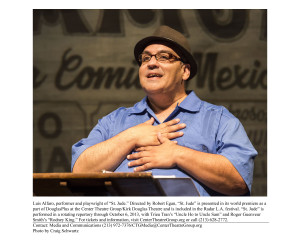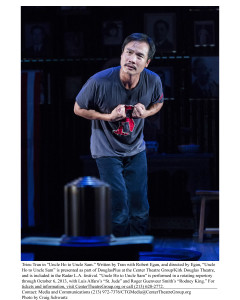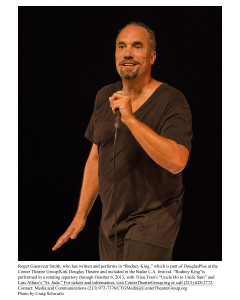As part of the Douglas Plus programming and Radar L.A., an international festival of contemporary theater, the Kirk Douglas Theater is home to three one-man shows. Two are very personal, intimate glimpses into the childhoods, and self-discoveries of the two performers. The third is an examination of the man who was savagely beat by police officers and the aftermath of that beating that rocked Los Angeles.
“St. Jude,” written and performed by Luis Alfaro, is a touching account of Alfaro’s childhood interspersed with reports and updates of his father’s illness, recovery and lapse back into illness. Alfaro tells his tale through a sequence of stories using the projection of a map of highway 99, and a pinprick of blood next to each city where the new story takes place. A religious song generally follows each pinprick as he tells of his childhood through religion and his Mexican heritage. Alfaro starts off light and many of his anecdotes are funny, but his tales soon grow darker as he delves into his demons. At some of the darkest moments, Alfaro is so immediate and raw that it almost feels that this is the first time that he has ever confessed these sins. Alfaro’s journey is not easy, but his gentleness and unflagging spirit are so infectious, that it’s hard to believe that he is anything but a better person for the hardships that he has faced.
“Uncle Ho to Uncle Sam,” written by Trieu Tran with Robert Egan and performed by Trieu Tran, is the harrowing tale of how Tran became the man that he is today. Born in Vietnam, he and his family were able to escape only to encounter pirates and then spend several months at a refugee camp in Thailand, before finally arriving in Canada. However, Canada proves to be a harsh experience and not just because of the weather. After the death of his father, he moves to Boston where street gangs and a corrupt teacher threaten his safety, but he finds solace in hip-hop and Shakespeare. It is only after another tragedy strikes that Tran’s focus turns to revenging his father’s death. Throughout the piece Tran always comes back to an optimistic hope, no matter what atrocities life has thrown at him. He explains that he wanted nothing more than to assimilate, but addresses the issue of racism and stereotypes, succinctly stating that America is the “melting pot that forgot to melt” and that America consists of the “caucasions and the rest of us.” Tran’s tale is breathtaking in its bald-faced honesty and strength. It is told with a simple beauty that connects the beginning with the end merging his past with his present day wisdom.
“Rodney King,” created and performed by Roger Guenveur Smith is the only piece of the three that is not autobiographical. Smith tells the story of the vicious beating of Rodney King by the LAPD and the resultant Los Angeles riots. However, Rodney King is not the good guy, or the hero in this telling. Instead, Smith focuses on the fact that King’s only accomplishment was being “the brother who survived the greatest a**-whoopin’ in history,” and after that whoopin’ he retreated and watched L.A. kill and burn itself down. To accentuate this, Smith relates the stories of innocents that were killed during the riots and stories of people who stepped up to help and save others, all while King stayed home and drank. Despite some very powerful moments, Smith fails to provide a why or a what. Why tell this story now? Why is it relevant today? What can we learn from this to make out future better? Instead there is a lot of frustration, and with a sluggish pace and no one or no thing/idea/concept to root for, it becomes hard to stay interested through to the end.
These three solo performances provide a much-needed glimpse into parts of our Americana that are generally overlooked. They are stories of survival, struggle and awakening. Tickets for the individual shows are $25, or you can get all three shows for $60.
*Coverage provided for the Culver City News



